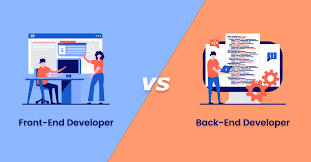
What is Web Development
Web development is a dynamic and essential field that powers the websites and applications we use daily. From social media platforms to e-commerce sites, web development encompasses a broad range of activities and skills required to build and maintain functional and user-friendly web services. This article provides an overview of web development, covering its key components, the different types of web development, and how to get started in this exciting field.
What is Web Development? Web development is the process of creating websites and web applications for the internet or an intranet (a private network). It involves a combination of coding, designing, and managing content to build sites that are accessible and usable across different devices and browsers. Web development can be broadly divided into three main categories: frontend development, backend development, and full-stack development.
Frontend Development: Frontend development focuses on the client-side of web development, which includes everything that users see and interact with in their web browser. Frontend developers use HTML (HyperText Markup Language) to structure content, CSS (Cascading Style Sheets) to style and layout the content, and JavaScript to add interactivity and dynamic elements. Key responsibilities include implementing responsive design, ensuring cross-browser compatibility, and optimizing performance.
Backend Development: Backend development deals with the server-side of web development, where the focus is on creating and managing the technology that powers the frontend. Backend developers work with server configurations, databases, and application logic. They use programming languages like Python, Ruby, PHP, Java, and frameworks such as Node.js, Django, or Laravel to handle server operations, database interactions, user authentication, and more.
Full-Stack Development: Full-stack development involves a combination of both frontend and backend development. Full-stack developers have the skills to work on both the client-side and server-side, allowing them to build complete web applications from start to finish. They are versatile professionals who understand the entire web development process and can bridge the gap between the frontend and backend.
Key Components of Web Development Web development involves several essential components and technologies. Here are some key elements:
HTML (HyperText Markup Language): HTML is the standard markup language used to create web pages. It defines the structure and content of a webpage using elements like headings, paragraphs, images, links, and more.
CSS (Cascading Style Sheets): CSS is used to style and layout web pages. It allows developers to control the appearance of HTML elements, including colors, fonts, spacing, and positioning. CSS enables responsive design, ensuring websites look good on different devices and screen sizes.
JavaScript: JavaScript is a scripting language that enables interactive and dynamic content on web pages. It allows developers to create features like sliders, forms, animations, and real-time updates. JavaScript frameworks and libraries like React, Angular, and Vue.js enhance development efficiency and capabilities.
Web Servers: Web servers are software or hardware systems that deliver web pages to users. They process requests from browsers and serve the appropriate content. Popular web servers include Apache, Nginx, and Microsoft Internet Information Services (IIS).
Databases: Databases store and manage data for web applications. Backend developers use databases to save user information, content, and other data. Common databases include MySQL, PostgreSQL, MongoDB, and SQLite.
APIs (Application Programming Interfaces): APIs allow different software systems to communicate with each other. In web development, APIs enable frontend and backend components to interact, as well as integrate third-party services like payment gateways, social media, and more.
Getting Started in Web Development Starting a career in web development involves learning and mastering various skills and technologies. Here are some steps to help you begin:
Learn the Basics: Start with the foundational languages: HTML, CSS, and JavaScript. There are many free online resources, tutorials, and courses available on platforms like W3Schools, Mozilla Developer Network (MDN), Codecademy, and FreeCodeCamp.
Build Projects: Practice by building simple web projects. Start with static websites and gradually move to more complex projects that include interactive elements and server-side components. Building projects will help you apply what you’ve learned and develop a portfolio.
Explore Frameworks and Libraries: Once you’re comfortable with the basics, explore popular frameworks and libraries. For frontend development, learn about React, Angular, or Vue.js. For backend development, explore Node.js, Django, or Laravel.
Understand Version Control: Learn version control systems like Git to manage your code. Platforms like GitHub and GitLab allow you to collaborate with other developers, track changes, and maintain code repositories.
Stay Updated: Web development is a constantly evolving field. Stay updated with the latest trends, tools, and best practices by following blogs, attending webinars, joining online communities, and participating in coding challenges.
Consider Formal Education: While formal education is not always necessary, taking courses or earning certifications can provide structured learning and enhance your credentials. Many universities and online platforms offer web development courses and bootcamps.
Web development is an exciting and ever-changing field that offers endless opportunities for creativity and innovation. By understanding the basics of frontend, backend, and full-stack development, and by continuously learning and practicing new skills, aspiring developers can build a successful career in web development. Whether you’re creating personal projects, contributing to open-source, or working for a company, the knowledge and skills you gain in web development will open doors to numerous possibilities in the digital world.




